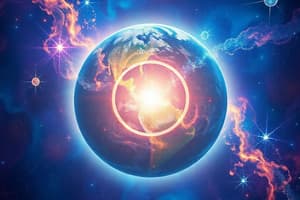Podcast
Questions and Answers
What theory claims that the universe has no beginning and no end?
What theory claims that the universe has no beginning and no end?
The Big Bang Theory suggests that the universe expanded from a large dense mass approximately 13.8 billion years ago.
The Big Bang Theory suggests that the universe expanded from a large dense mass approximately 13.8 billion years ago.
Who is considered the first proponent of the Big Bang Theory?
Who is considered the first proponent of the Big Bang Theory?
What is a major evidence supporting the Big Bang Theory?
What is a major evidence supporting the Big Bang Theory?
What phenomenon describes the change in frequency of light from galaxies as the universe expands?
What phenomenon describes the change in frequency of light from galaxies as the universe expands?
The law of ___________ relates gravity to the distortion of space-time.
The law of ___________ relates gravity to the distortion of space-time.
What did Isaac Newton introduce that refined the Copernican model?
What did Isaac Newton introduce that refined the Copernican model?
The geocentric theory proposed by Ptolemy states that __________ is at the center of the universe.
The geocentric theory proposed by Ptolemy states that __________ is at the center of the universe.
Flashcards are hidden until you start studying
Study Notes
The Origin of the Universe
- Theories explain the universe's origins, evolving from various hypotheses, with the Big Bang Theory being the most prominent.
- Distinction exists between hypotheses (proposed explanations) and theories (well-tested and supported explanations).
- Doppler effect leads to red-shift, indicating an expanding universe and supporting modern cosmology.
Non-scientific Origins
- Ancient Egyptians believed in multiple gods, proposing the universe emerged from an infinite sea at sunrise.
- Indian narratives tell of the sacrifice of Purusha, with his body forming celestial bodies.
- Monotheistic religions (Judaism, Christianity, Islam) assert a supreme being created the universe and life.
Ancient Theories
- Democritus, a Greek philosopher, proposed an atomic universe composed of indivisible atoms.
- Ptolemy's geocentric theory placed Earth at the center of the universe, later challenged by Copernicus's heliocentric model in 1543.
- Isaac Newton refined heliocentrism with the law of universal gravitation, applying classical physics to the universe.
- A static and unchanging view of the universe persisted until Einstein's general relativity introduced dynamic models.
Modern Theories
-
Steady State Theory: Proposed by Fred Hoyle, Thomas Gold, and Hermann Bondi, this theory posits the universe has always existed and maintains constant density as it expands. It was rejected after cosmic microwave background evidence contradicted its predictions.
-
Big Bang Theory:
- Currently accepted model of the universe's origin, suggesting it expanded from a dense and hot state approximately 13.8 billion years ago.
- Based on General Relativity, which describes gravity as space-time distortion rather than a force and has been rigorously tested.
- Incorporates the Cosmological Principle, stating the universe is homogeneous and isotropic on a large scale but clumpy on smaller scales.
- Georges Lemaître, a Belgian priest, theorized the expanding universe and is considered the first proponent of the Big Bang Theory.
Evidence for the Big Bang Theory
- The theory is supported by several scientific observations, including cosmic microwave background radiation, which indicates remnants of the initial expansion and the current expansion of the universe.
Studying That Suits You
Use AI to generate personalized quizzes and flashcards to suit your learning preferences.




